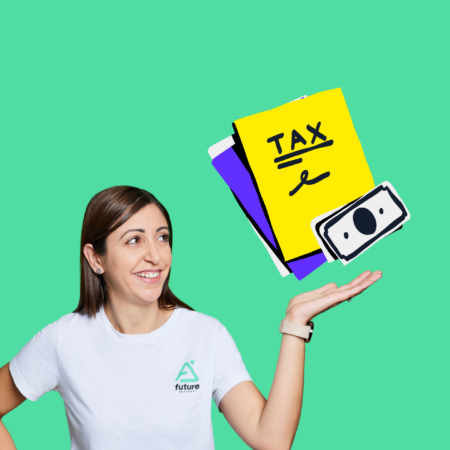How Can I Make a Holiday a Tax Deduction?
Not sure about you… But it seems every person and their dog are either soaking up some QLD sun or sipping on an Aperol in Italy at the moment. We know a lot of you are wondering whether you can claim flights on tax in Australia, or if holidays are a strictly personal expense. Here’s the answer to those questions!
Key Highlights
- Business vs. Holiday Travel: Work trip tax deduction rules come down to purpose; travel is only deductible if it’s mainly for business. Travel is tax-deductible only if it’s primarily for business—like meetings or conferences. Holidays or remote work from the beach don’t count. Split costs clearly if combining both.
- What You Can Claim: You can claim flights, transport, accommodation, and meals may be claimed as part of your business travel tax deduction, but only for the business portion. Leisure activities, family expenses, and personal add-ons are not deductible.
- Keep Records: Track everything—receipts, itineraries, and proof of business purpose. Mistakes or missing records can lead to penalties, so check with your accountant before booking.
What is a tax deduction?
A tax deduction is a reduction in income that is allowed or sanctioned under the tax laws. Deductions reduce the base amount of income on which an individual is taxed. Certain expenses, sometimes called itemized deductions, have been known as deductions for many years. However, tax law changes have broadened the term “deduction” to include eliminated income, such as credits and exemptions; these create revenue offsets for government bills.
When you claim deductions, it directly impacts your taxable income, ultimately lowering your overall tax liability. The ATO guidelines on tax deductions are clear: to qualify, expenses must be ordinary and necessary for your trade, business, or profession. By carefully tracking your deductible expenses, you can maximise your tax-saving strategies and keep more profit in your pocket.
What defines a business expense?
A business expense is incurred for the purpose of generating income or profit. It’s an expense you deduct from your taxable income, and therefore lowers your tax liability. You can claim expenses associated with running your business, like hiring staff, buying equipment, marketing materials, travel costs, and more.
There are some restrictions on what counts as a legitimate expense, though… and listing those would take far more than a blog post. A simple example, however, is if you were a delivery driver and you use your car 90% of the time for work. Then 90% of your fuel expenses would be a tax deduction.
So what’s a holiday and what’s a business trip?
This is the foundation of a valid business trip tax deduction. If it’s work-first, there’s a tax case.
The answer here is pretty simple: if your travel (or parts of it) is undertaken to produce business revenue – whether that’s landing a new client or maintaining an existing relationship, for example – then it’s deductible.
If you’ve booked flights to lie on a beach somewhere – even if you’ll be working remotely – that’s a holiday. The travel (sadly) isn’t necessary to perform those standard work tasks, so the cost is entirely on you.
The following table gives an in-depth look at what distinguishes holidays from business trips.
| Holiday | Business Trip | |
| Primary Purpose | Leisure, relaxation, and personal enjoyment | Work-related activities (meetings, conferences, client visits) |
| Motivation | Personal fulfilment, escape from routine | Professional development, generating revenue, and building relationships |
| Itinerary | Flexibility often includes sightseeing and tourism | Structured, focused on work-related appointments |
| Expenses | They are generally borne by the traveller | Typically reimbursed by the employer (travel, accommodation, meals) |
| Tax Implications | Usually not tax-deductible | Often tax-deductible (within certain limits) |
| Visa Requirements | May vary depending on nationality and purpose of visit | Specific visa requirements may apply for work purposes |
| Accommodation | Hotels, resorts, vacation rentals | Hotels, serviced apartments (often chosen for proximity to work locations) |
| Activities | Sightseeing, dining, entertainment, shopping | Work meetings, client presentations, and industry events |
Another helpful tip is to plan a holiday alongside your business trip to maximise your tax deductions. For combined trips, only the business-related expenses are deductible. If you add a holiday, make sure to separate costs. However, suppose you enjoy an incidental holiday at the end of your trip without significantly increasing costs. In that case, the trip is still considered business, and most of your travel expenses remain deductible.
Keep those business and personal costs separate, and you’ll be all set for a tax-friendly trip!
What kind of travel can be claimed as a holiday tax deduction?
Want to turn your travel expenses into tax savings? It’s possible if you know which business trip deductions are allowed:
- Airfares
- Train, tram, bus, taxi, or ride-sourcing fares
- Car hire fees and the costs you incur (such as fuel, tolls and car parking) when using a hire car for business purposes
- Accommodation
- Meals, if you are away overnight.
And if you’re asking, “can I claim my vacation on my taxes?”—only the business-related portion qualifies.
Similar to our first example of a general tax deduction, the same rule applies here. If you’re going on a 10-day trip, and only two of those days are spent at a conference, then only 20% of your accommodation expenses are deductible, for instance.
It’s important (and fun) to note that the entire flight is deductible, though, because you need it to fly to that conference no matter how long you end up spending over there.
Other examples include…
- A research trip: you’re an importer of homewares and you’re flying to Bali to tour some different production facilities, gathering information and seeing how they operate with your own eyes. This is a legitimate business activity that will directly affect your future income
- Meetings: this one is less common in the post-COVID (or mid-COVID?) days because there’s a thing called Zoom, but sometimes face-to-face meetings are still needed. If Jase and Greg fly to Perth to meet Shelley and chat about Future Advisory business financial planning, that’s clearly a business expense. If they choose to stay another three nights and hop on the Rottnest ferry for a Quokka selfie, that’s on them
- Conferences: probably the most common kind of business trip. It’s about networking, upskilling… all the good things that ultimately add to your bottom line. Deductible!
If you’re managing travel expenses as a tradie, it’s critical to separate work and personal expenses accurately. For tailored advice and tips, check out this guide on accounting for tradies.
What kind of travel can not be claimed as a holiday tax deduction?
You can only deduct the costs directly related to your work trip. That means no personal expenses like a vacation tacked onto your business trip, bringing your family along, souvenirs, sightseeing, visas, travel insurance for personal reasons, moving costs, or any travel before you even started your business.
What if you’ve got an employee who’s always on the move?
Managing deductible operating costs like flights, meals, and accommodation for businesses with employees travelling frequently becomes part of routine expense tracking. Employers should ensure their team maintains clear documentation to meet tax compliance standards.
Proper training on recording travel-related expenses can help employees understand which costs are reimbursable, ensuring smooth operations and accurate tax reporting.
How do you claim tax deductions on work-related travel?
Navigating tax deductions can be confusing. But don’t worry; we’re here to simplify the process. Learn how to claim deductions for your work-related travel expenses easily.
Receipts and Records: What You Must Keep
Two words: keep records. Going to a meeting? You need the correspondence of the organisation and confirmation of the other attendees. Conferences are easy with proof of ticket purchase. Accommodation receipts, taxis, food – all of it. If you don’t keep the records to prove what you were doing over there, then the ATO might have a few choice words for you. An itemised travel diary or itinerary is also required.
Filing Your Tax Return with Business Travel Deductions
Is tax time coming up? Don’t let those travel expenses slip through the cracks! Make sure you have all your receipts and records organised. Using accounting software can make your life much easier – it’s like having a super-organised travel journal that does the math for you.
And if you’re feeling overwhelmed, don’t hesitate to talk to a tax expert. They can help you navigate the tax code and ensure you get all the deductions you deserve. You worked hard for your money, so let’s ensure you keep more of it!
Avoiding Common Tax Traps
It’s easy to make mistakes when claiming tax deductions, like exaggerating how much you use your car for work or losing track of necessary receipts. Misclassifying travel expenses can also cause problems. To avoid penalties and maximise your deductions, ensure you’re always up-to-date on the latest tax laws and guidelines.
As with anything finicky and tax-related, ask us first! Before you hit the book, let us know what your plans are so we can make sure you’re going about it in the most tax-effective way with our accounting and tax service.
Planning a trip and wondering if it’s deductible? Ask us first to maximise your business trip tax deductions and avoid any ATO surprises.
Need to chat? Find us here.











